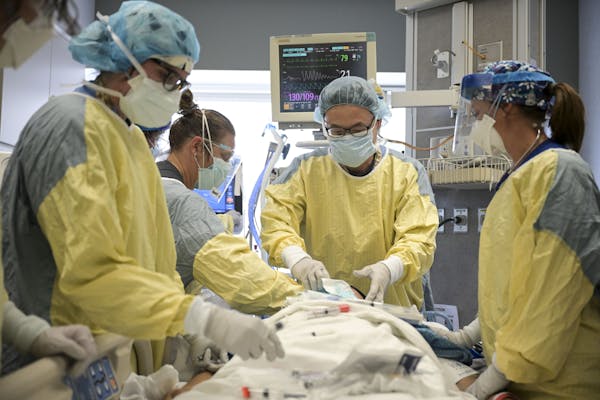Gov. Tim Walz says Minnesotans must learn to live well into the future with the lingering threat of COVID-19 — but not necessarily with the executive orders and mandates that dominated the early months of the pandemic.
"We've moved from pandemic to end-demic," Walz said Thursday in a wide-ranging interview. "What we've learned over the last 18 months is we're going to have to figure out smart ways to live with this into the future.
"I don't like to acknowledge it, but we're going to have to live with this for years."
The governor offered that sobering forecast against the backdrop of the opening day of the Minnesota State Fair, which drew lighter-than-usual crowds Thursday over concerns about the fast-spreading delta variant of the virus and the fact that the fair has no masking requirement.
While states such as Oregon and Illinois are moving to reinstate mask mandates in many situations, Walz said his executive orders became so politicized in Minnesota "that it might be counterproductive."
Starting last year, Walz issued dozens of executive orders, such as mask mandates and business closures, over a span of 15 months to respond to the pandemic. He gave up those emergency powers in July as part of a deal with the divided Legislature to pass a biennial budget and avoid a government shutdown.
"We're going to have to learn to live with this without the executive orders," said Walz, adding that he wants the Legislature to get more involved in making day-to-day decisions about COVID. "It appears like there's a lot of silence out of a lot of folks in the Legislature because now it's on them." Walz said he expects that roughly 20% of Minnesotans won't be vaccinated against COVID regardless of incentives provided by the state. The state is offering $100 to the first 3,600 people who get their first dose of the vaccine at the State Fair.
"I think you have to come to the realization [that] we're going to be living with about 20 percent of folks unvaccinated, and what does that mean?" he said. "It's not throwing up my hands and giving up, but it's a realization that I'm not going to crush this like smallpox and eradicate it from the world. It's going to be with us."
COVID has dominated Walz's first term as governor and will provide plenty of fodder for Republican candidates seeking to challenge him in 2022. Walz had a 57% approval rating in a September 2020 Star Tribune/MPR News/KARE 11 Poll, dropping 8 percentage points from a high watermark earlier that spring.
Five Republicans have jumped into the race, including former state senator and physician Scott Jensen, whose campaign seeks to bring together opponents of Walz's handling of the pandemic. State Sen. Michelle Benson, R-Ham Lake, and Senate Majority Leader Paul Gazelka, who frequently sparred with Walz over COVID restrictions, are also considering a run for governor.
Walz hasn't announced whether he plans to seek a second term, in part because he said he wants get some "stability" in the status of the pandemic. An announcement is likely in the fall.
"I've never believed that I'm the only person who can do this job. At this point in time, though, I'm not seeing anybody else that I would trust doing it," Walz said of the GOP field for governor. "Mainly because of the approach to the pandemic and just a whole bunch of misinformation and things that I think is dangerous, quite honestly."
But first, Walz said, he expects to call the Legislature back to the Capitol in mid-September to pass a $250 million aid package for essential workers and relief for farmers suffering from the summer drought.
This time he's being careful about the parameters of the deal, after Republican senators moved to reject two of his commissioners during last year's special sessions, and prompted another to resign in July rather than face rejection.
"It's that trust-but-verify thing," Walz said. "I'm not going to come back and lose a commissioner."

University of Minnesota police arrest 9 after pro-Palestinian encampment set up on campus
2 dead in Lino Lakes, no known threat to public, police say
Teen charged with murder in deadly St. Paul shooting last month

